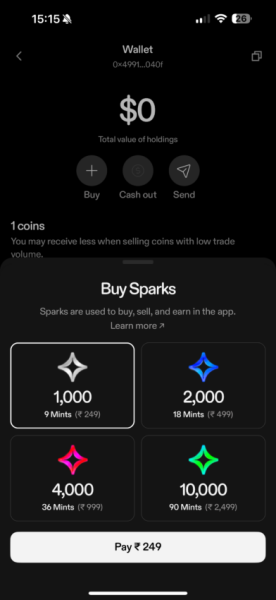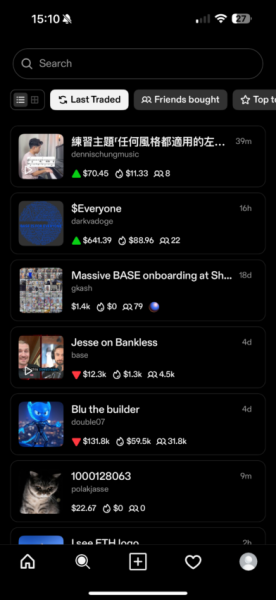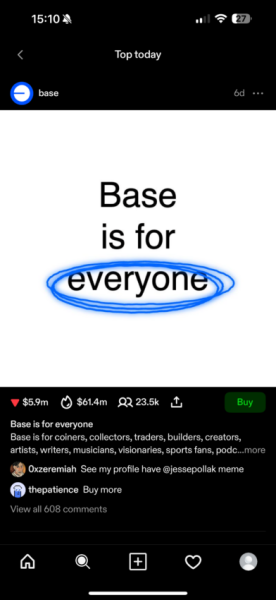What Are Content Coins? Everything You Need To Know

We’re seeing random tweets turn into tokens. Some think it’s the future of crypto, while others brush off the trend as just another meme wave. So, what’s actually going on with these content coins? Here’s why people are buying tokens tied to tweets and videos and what Coinbase’s Base network has to do it.
In this guide:
- What are content coins?
- How do content coins work?
- Why are content coins showing up on Base?
- Content coins vs meme coins, NFTs, and other tokens
- Use cases: Where could this go?
- Risks and criticisms of content coins
- The road ahead for content coins
What are content coins?
A content coin is a crypto token created around one specific piece of content. That content could be anything: a tweet, a meme, a video, or even a blog post. Instead of representing a brand or a project, the token represents that single post. One moment, one coin.
This format has gained popularity due to how easy it is to mint a token these days. That’s where Zora enters the picture.
What is Zora?
Zora is a protocol that lets people turn content into tokens and one of the main tools used to mint content coins. Zora is often mentioned in the same breath as platforms like PomPom or Farcaster; all are part of this new wave of on-chain social tools. Zora is the one focused entirely on tokenizing media.

Zora interface: Zora
Technically, Zora is built using the OP Stack, the same foundation used by Base, Coinbase’s layer-2 network. That’s why most content coins minted on Zora are showing up on Base. It’s cheaper, faster, and already backed by one of the biggest names in crypto.
How do content coins work?
Once a piece of content is picked, it gets minted into a token. That token becomes the content coin, and can be traded just like any other crypto token.
This starts on platforms like Zora, where anyone can upload content and mint it on-chain. From there, the coin can be listed on a decentralized exchange. Users can buy it, hold it, or flip it based on how they think the content will perform.
Some content coins gain traction for cultural reasons: a joke that lands, a tweet that blows up. Others pump fast, then crash.

Top content coins: Zora
Why are content coins showing up on Base?
As previously alluded to, the majority of this activity is happening on Base. The network is faster and cheaper than the Ethereum mainnet, making it ideal for high-volume tokens tied to fast-moving content.
However, the technical side is just half the story. The bigger reason this is all happening on Base is because of Jesse Pollak, the guy leading the project. He’s the one who first framed content coin crypto as a cultural format, not just another type of token. His now-famous phrase, “Base is for everyone,” was minted into a token itself.
Content coins vs meme coins, NFTs, and other tokens
Are we just talking about meme coins with new packaging? Ultimately, the hype, speed, and speculation feels the same. Tokens fly off the charts based on a tweet or a phrase. People ape in, price spikes, then drops. It does feel familiar.
A content coin, on the other hand, starts with one specific post. It could be a message, an image, or even a random screenshot. The token represents that exact piece of content.
Compared to NFTs, the structure is also different. NFTs are non-fungible, meaning one person owns one version. Content coins are usually fungible, meaning everyone can own a piece. That makes them easier to trade, and, in some ways, easier to manipulate.
Use cases: Where could this go?
Right now, content coins are mostly speculative. However, there are a few possible directions this could take if the infrastructure and incentives line up.
Most obviously, they could spark a whole new avenue of creator monetization. There’s also room for them to galvanize community engagement. Of course, it’s not guaranteed we will be talking about content coins in the months and years to come. As with many shiny new things in crypto, they may amount to little more than just a passing trend.
Risks and criticisms of content coins
The biggest criticism is that we are essentially talking about meme coins, just dressed up with better branding. Many of the crypto community have expressed that this asset class only exists because the meme coin market has cooled off. So now, instead of launching a dog coin, you mint a token tied to a tweet and hope it trends.
Then there’s the speed. Most of these coins are pumped and dumped in hours. You’ll see volume fly, holders pile in, and then exit within a day.
Some people have also raised concerns about insider activity. In the case of “Base is for everyone,” a few wallets bought the token early; before the public even knew it existed. Those wallets made six figures. That kind of trading pattern draws heat, especially in a space trying to avoid old-school finance behavior.

First breakout content coin: Zora
The other problem is that these tokens have no utility. They don’t unlock anything, and you’re not staking them or voting with them. You’re just hoping the content gets views and that the coin gets volume. It’s entertainment-driven speculation. For some, that’s fine. For others, it’s a red flag.
The road ahead for content coins
The hype may cool, but the format isn’t going away. Content coins have shown that single posts, memes, or messages can be minted and traded like assets. If creator tools evolve and platforms like Zora and Base keep pushing, this could grow beyond a niche. Whether you call it speculation or the next step in crypto for creators, the experiment is already live.
 Bitcoin
Bitcoin  Ethereum
Ethereum  Tether
Tether  XRP
XRP  USDC
USDC  Solana
Solana  TRON
TRON  Lido Staked Ether
Lido Staked Ether  Figure Heloc
Figure Heloc  Dogecoin
Dogecoin  WhiteBIT Coin
WhiteBIT Coin  Cardano
Cardano  USDS
USDS  Bitcoin Cash
Bitcoin Cash  Wrapped stETH
Wrapped stETH  LEO Token
LEO Token  Hyperliquid
Hyperliquid  Wrapped Bitcoin
Wrapped Bitcoin  Monero
Monero  Binance Bridged USDT (BNB Smart Chain)
Binance Bridged USDT (BNB Smart Chain)  Chainlink
Chainlink  Canton
Canton  Ethena USDe
Ethena USDe  Stellar
Stellar  Wrapped eETH
Wrapped eETH  USD1
USD1  Rain
Rain  sUSDS
sUSDS  Hedera
Hedera  PayPal USD
PayPal USD  Dai
Dai  Coinbase Wrapped BTC
Coinbase Wrapped BTC  Litecoin
Litecoin  Avalanche
Avalanche  Zcash
Zcash  WETH
WETH  Sui
Sui  Shiba Inu
Shiba Inu  Cronos
Cronos  USDT0
USDT0  World Liberty Financial
World Liberty Financial  Toncoin
Toncoin  Tether Gold
Tether Gold  Polkadot
Polkadot  MemeCore
MemeCore  PAX Gold
PAX Gold  Uniswap
Uniswap  Ethena Staked USDe
Ethena Staked USDe  Mantle
Mantle  BlackRock USD Institutional Digital Liquidity Fund
BlackRock USD Institutional Digital Liquidity Fund  Circle USYC
Circle USYC  Global Dollar
Global Dollar  Aster
Aster  Aave
Aave  Falcon USD
Falcon USD  Bittensor
Bittensor  OKB
OKB  Pi Network
Pi Network  Sky
Sky  syrupUSDC
syrupUSDC  NEAR Protocol
NEAR Protocol  Bitget Token
Bitget Token  Pepe
Pepe  Ripple USD
Ripple USD  HTX DAO
HTX DAO  Ethereum Classic
Ethereum Classic  BFUSD
BFUSD  Internet Computer
Internet Computer  Ondo
Ondo  Superstate Short Duration U.S. Government Securities Fund (USTB)
Superstate Short Duration U.S. Government Securities Fund (USTB)  POL (ex-MATIC)
POL (ex-MATIC)  Pump.fun
Pump.fun  Gate
Gate  Worldcoin
Worldcoin  KuCoin
KuCoin  Jupiter Perpetuals Liquidity Provider Token
Jupiter Perpetuals Liquidity Provider Token  Midnight
Midnight  Cosmos Hub
Cosmos Hub  Jito Staked SOL
Jito Staked SOL  Ethena
Ethena  NEXO
NEXO  USDtb
USDtb  Official Trump
Official Trump  Binance-Peg WETH
Binance-Peg WETH  Rocket Pool ETH
Rocket Pool ETH  Spiko EU T-Bills Money Market Fund
Spiko EU T-Bills Money Market Fund  Binance Bridged USDC (BNB Smart Chain)
Binance Bridged USDC (BNB Smart Chain)  Algorand
Algorand  OUSG
OUSG  Wrapped BNB
Wrapped BNB  Filecoin
Filecoin  Function FBTC
Function FBTC  Aptos
Aptos  Janus Henderson Anemoy AAA CLO Fund
Janus Henderson Anemoy AAA CLO Fund  USDD
USDD  Render
Render  Ondo US Dollar Yield
Ondo US Dollar Yield  syrupUSDT
syrupUSDT  Stable
Stable  VeChain
VeChain  Binance Staked SOL
Binance Staked SOL  Beldex
Beldex  Arbitrum
Arbitrum  pippin
pippin  Jupiter
Jupiter  Janus Henderson Anemoy Treasury Fund
Janus Henderson Anemoy Treasury Fund  Usual USD
Usual USD  Polygon Bridged USDC (Polygon PoS)
Polygon Bridged USDC (Polygon PoS)  GHO
GHO  Solv Protocol BTC
Solv Protocol BTC  Bonk
Bonk  Lombard Staked BTC
Lombard Staked BTC  Decred
Decred  A7A5
A7A5  TrueUSD
TrueUSD  clBTC
clBTC  Stacks
Stacks  Sei
Sei  Virtuals Protocol
Virtuals Protocol  EURC
EURC  StakeWise Staked ETH
StakeWise Staked ETH  USDai
USDai  PancakeSwap
PancakeSwap  Kinetiq Staked HYPE
Kinetiq Staked HYPE  tBTC
tBTC  Pudgy Penguins
Pudgy Penguins  Tezos
Tezos  WrappedM by M0
WrappedM by M0  Dash
Dash  JUST
JUST  Kinesis Gold
Kinesis Gold  Power Protocol
Power Protocol  Ether.fi
Ether.fi  LayerZero
LayerZero  Mantle Staked Ether
Mantle Staked Ether  Curve DAO
Curve DAO  c8ntinuum
c8ntinuum  Polygon PoS Bridged DAI (Polygon POS)
Polygon PoS Bridged DAI (Polygon POS)  Lighter
Lighter  Resolv wstUSR
Resolv wstUSR  COCA
COCA  Artificial Superintelligence Alliance
Artificial Superintelligence Alliance  Chiliz
Chiliz  Gnosis
Gnosis  Liquid Staked ETH
Liquid Staked ETH  PRIME
PRIME  Arbitrum Bridged WBTC (Arbitrum One)
Arbitrum Bridged WBTC (Arbitrum One)  BitTorrent
BitTorrent  ADI
ADI  AINFT
AINFT  Aerodrome Finance
Aerodrome Finance  Wrapped Flare
Wrapped Flare  Kaia
Kaia  Story
Story  L2 Standard Bridged WETH (Base)
L2 Standard Bridged WETH (Base)  SPX6900
SPX6900  Steakhouse USDC Morpho Vault
Steakhouse USDC Morpho Vault  Bitcoin SV
Bitcoin SV  Injective
Injective  IOTA
IOTA  Sun Token
Sun Token  Celestia
Celestia  Binance-Peg XRP
Binance-Peg XRP  crvUSD
crvUSD  Ether.Fi Liquid ETH
Ether.Fi Liquid ETH  Pyth Network
Pyth Network  Renzo Restaked ETH
Renzo Restaked ETH  The Graph
The Graph  Maple Finance
Maple Finance  sBTC
sBTC  JasmyCoin
JasmyCoin  Legacy Frax Dollar
Legacy Frax Dollar  Olympus
Olympus  Jupiter Staked SOL
Jupiter Staked SOL  River
River  Savings USDD
Savings USDD  FLOKI
FLOKI  Optimism
Optimism  DoubleZero
DoubleZero  Marinade Staked SOL
Marinade Staked SOL  Lido DAO
Lido DAO  Arbitrum Bridged WETH (Arbitrum One)
Arbitrum Bridged WETH (Arbitrum One)  Venice Token
Venice Token  BTSE Token
BTSE Token  Conflux
Conflux  Telcoin
Telcoin  Staked Aave
Staked Aave  Terra Luna Classic
Terra Luna Classic 